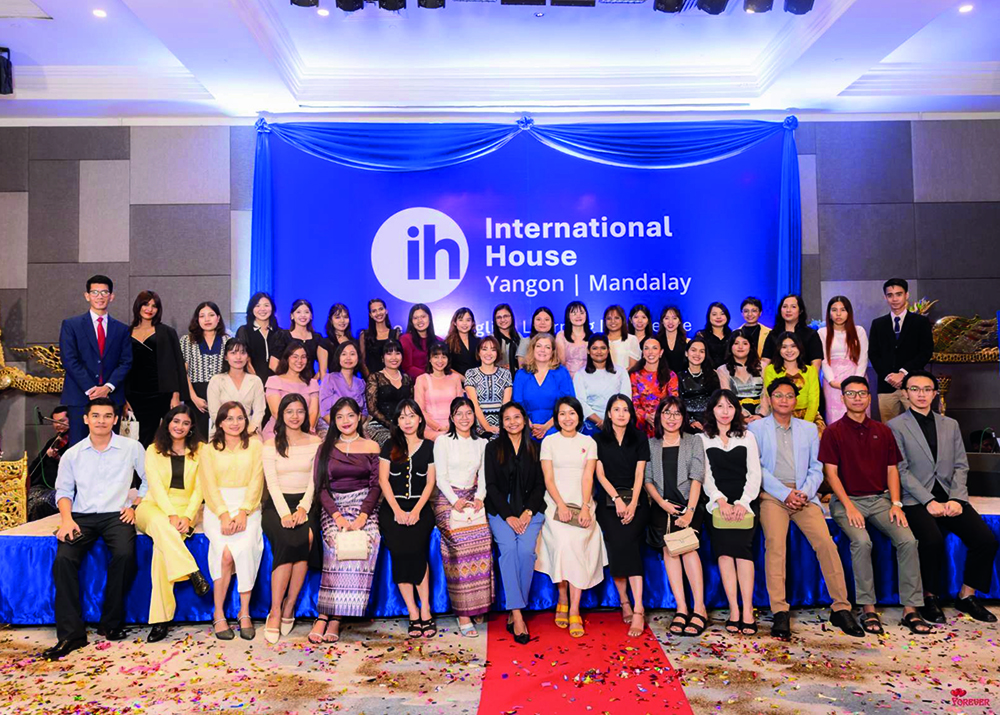In this issue we focus on one school and one country – Myanmar.
The land of golden pagodas
In Myanmar, once known as Burma, land of golden pagodas and multiple cultures, a small group of language schools offer hope, stability and professional development to teachers, as well as much-needed skills to students young and old. The cities nestle between jungles and low clouds, golden temple domes peeking into the sky. Once popular among tourists, Myanmar is significantly more complex to visit nowadays.

The language academy opened less than a decade ago as ‘SPACE’, in 2017, with just two classrooms. There are now over 5,000 students studying in three schools and online with more than 70 teachers (both full time and part time). In December, the directors achieved their lifetime ambition of joining a quality international language teaching organisation when they were accepted as members of the International House World Organisation, becoming International House Yangon and Mandalay.
Like all schools, they face challenges, like changing student expectations, a competitive market and the operational challenges of delivering quality communicative classes online. But in Myanmar they face multiple additional challenges, and the staff have become adept at finding creative solutions.
Skill scarcity: Most of those who have been able to leave the country have done so. This left very few qualified teachers within Myanmar. In response, the school designed an excellent teacher training programme. However, due to the imbalance between demand and skill supply in the ELT industry in Myanmar, the school often finds that the teachers they train are promptly headhunted by other local schools.
Supplies: Myanmar often experiences a shortage of supplies, so there can be delays of several months in the arrival of building materials, office supplies or coursebooks. The school managed one of these issues by reaching a special agreement with Cambridge University Press to print locally.
The economic situation: Due to inflation, general expenses have increased significantly. People cannot afford to pay rising course prices, so the school tries to stay profitable enough to survive while keeping its services affordable. Staff can struggle, too, and the school has various loan schemes and ways to support staff when they face difficulties or want to do additional training.
Energy and daily life: In major cities like Yangon and Mandalay, electricity is available for a few variable hours a day, with even less supply in other towns. As you can imagine, this has the immediate effect of disrupting online classes for students and teachers. And there are other, less obvious impacts, too, power sometimes only comes on at midnight, so people wake up for essential tasks like pumping water and charging devices in the middle of the night. In Myanmar’s tropical climate, sleeping without air conditioning in cramped apartments affects rest and overall wellbeing. Limited electricity significantly impacts the quality of life for teachers, staff and students.
A modest start, a remarkable journey
In Myanmar, learning English through a communicative approach was once considered a luxury, accessible only to those from upper-middle-class backgrounds. Most language schools focused on Young Learners and teenagers. However, as foreign investments surged in 2016, there was a growing need for working adults to learn English for better job opportunities in international companies. Seeing this gap, the school’s female directors Tharaphi and May Mon (winner of Southeast Asia’s Woman of the Future award in 2023) launched affordable language classes using communicative teaching methods, specifically targeting working adults who had never learnt English or had lost touch with it. Their beginner course, ‘Zero to Hero’, became the key driver of our success.
Over 90% of the workforce in the school is women and many are now the primary providers for their families. They are a contented workforce, happy to be part of a professional and growing team and some of the most dedicated teachers and professionals you can hope to meet.
Having already visited in 2024, I spoke to some of their teachers in early 2025 (their real names have not been used) to ask about their personal experiences of teaching in Myanmar.

Luke
Luke teaches Burmese students online; he is based in Bangkok where he is studying at the university. He is a fresh-faced and enthusiastic 24-year-old who lives in university accommodation for now.
Luke smiles as I join the video, he’s been waiting for half an hour because he didn’t want to miss our chat. He was a student at SPACE when he was younger and was impressed by the way teachers engaged their students in contrast to his experiences at school. He applied for the school’s internship programme and, despite his insecurities, was accepted. In teaching, he has discovered a passion that makes him feel complete. Luke says that the job with International House Yangon and Mandalay is incredibly important to him, to the extent that it means that he is doing something meaningful with his life and time. He plans on staying with the school for the foreseeable future, largely because of the way the directors care for their employees.
Thiri
Thiri lives with her family in the Burmese capital, Yangon. She looks younger than her 32 years, eight of which she has spent teaching in the school. When she tells me about how she used to play teacher as a child, I recognise the pattern. She has been a teacher for as long as she can remember and now she gets paid for it! Thiri dreams of studying in the UK one day but, for now, she is the breadwinner for her family and supporting her parents.
Thiri is representative of the teaching team in her positivity. She chose this school over the competition because it promotes quality teaching and supports teachers. She wants to pass on what she has learnt to colleagues and other teachers; she loves being part of a teacher community that is reflective and focused on ongoing improvement.
Thiri focusses a lot on her relationship with students and makes it a rule to leave any worries and problems at home. She tells me proudly that the student feedback she receives often says that students love her smile.
Hnin Wai
Hnin Wai lives in Mandalay where she shares a flat provided by the school with another teacher and goes home to see her family once a week. She is very happy to have all her bills covered in the teacher’s flat as she is an only child and, like Thiri, supports her parents.
Hnin Wai joined the school just over a year ago, she didn’t have many expectations when she started and was planning, as many do, to leave and move to Thailand. Since then, she has discovered how encouraging and supportive this particular workplace can be, and she became a full-time teacher in June 2024. Before joining the school, while working in an office, she dreamt of working somewhere with opportunities to develop professionally, and she now feels she has that in IH Mandalay. She describes her job as a key part of her life that, like Luke, provides her with a sense of fulfilment.
Hnin Wai is inspired by her hardworking and high-achieving female bosses. She agrees with their vision of a school that promotes staff wellbeing while growing a successful business, and plans to keep on training until she has the DELTA.
Building confidence
The official language is Burmese but over 100 languages are spoken. The Burmese script has 33 consonants and 12 vowels but also features a unique circular writing style. That said, the major difficulty that teachers reported that students face does not seem to be the alphabet, the phonology or the vast differences between L1 and English.
All three teachers describe the same major challenge: building students’ self-confidence. In traditional classes in Myanmar, students are taught to memorise content. Getting them to speak can be a challenge. Luke has recently noticed that his online students will use AI to prepare their answers during classes before participating in a discussion for fear of embarrassing themselves by making a mistake. To combat this, he works hard to build rapport and create a safe space in his lessons, giving students the option to contact him outside of classes. He uses gentle coaching terms in his communications with students, peppered with encouraging emojis.
Thiri also talked about the fear of making mistakes being especially prevalent among Burmese students. She tackles this by simulating real-life situations, interviews and role plays. As a teacher she adopts a process of continual reflection and adaptation, considering how best to support her students and create a supportive environment. She talks to students about mistakes never being a waste and consciously works to show her students the benefits of imperfect practice.
I asked Hnin Wai where this lack of confidence might come from, she describes a social system that puts teachers and leaders on a pedestal. She talks about disheartening experiences students have had in the public schools where it is commonplace to be mocked and laughed at for making mistakes. She learnt quickly that feedback is taken very much to heart and taken as a personal criticism, so she has had to adapt what she does in the classroom to address errors in a way that her students can manage.
What is next?
It is difficult to know what the future holds for Myanmar, but the teachers remain optimistic. They are excited to have joined an international organisation that gives them the chance to participate in training exchanges. Having witnessed their ability to continue providing a quality service despite challenges, we can be sure that IH Myanmar has the ability to evolve and grow, looking for solutions and supporting its workers.




